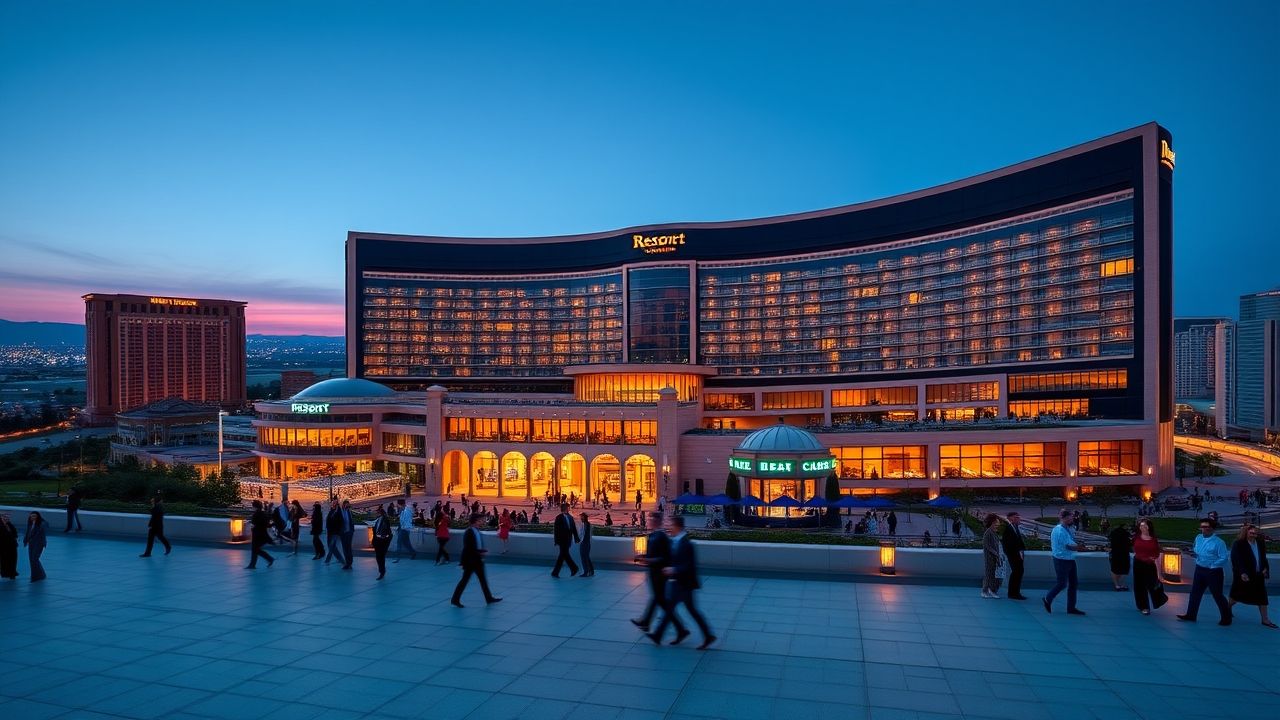The Shifting Landscape of the Modern Casino: Beyond the Glitz
The allure of the modern casino, with its shimmering lights and promise of excitement, often overshadows its complex role in our society. Far from being mere entertainment venues, today’s casinos are multifaceted enterprises that profoundly impact local economies, generate significant tax revenues, and navigate intricate regulatory frameworks. This deep dive aims to peel back the layers, revealing the true dynamics of an industry constantly reinventing itself while grappling with its social responsibilities.
In my 12 years covering this beat, I’ve found that the narrative around the casino industry is far more complex than the flashing lights suggest. It’s a story of economic development, social welfare, technological innovation, and evolving public perception. Understanding this ecosystem is crucial for anyone seeking to grasp its full significance.
Key Summary
- Modern casinos are significant economic engines, driving tourism and creating numerous jobs.
- The industry operates under strict, evolving regulatory frameworks designed to ensure fairness and prevent illicit activities.
- Responsible gaming initiatives are a cornerstone of contemporary casino operations, addressing potential social challenges.
- Technological advancements, particularly in online gaming, continue to reshape the traditional casino landscape.
- Public perception and policy surrounding casinos are dynamic, reflecting ongoing debates about their benefits versus societal costs.
Why This Story Matters
The establishment or expansion of a casino is rarely a simple business decision; it’s a high-stakes bet with profound social and economic implications for any community. These integrated resorts are designed not just for gambling but also to serve as comprehensive entertainment destinations, featuring hotels, restaurants, retail outlets, and live performance venues. This expansive model means they contribute significantly to local tourism, infrastructure development, and diverse job creation, ranging from hospitality and culinary arts to security and management.
Beyond the direct economic injection, the tax revenues generated by casinos often fund crucial public services, from education and infrastructure projects to healthcare and community development programs. However, this economic upside is meticulously balanced against potential societal costs, such as increased traffic, strain on local services, and the critical issue of problem gambling. My reporting has consistently shown that the true impact of a casino is a nuanced interplay of these factors, requiring careful consideration and robust policy.
Main Developments & Context
The casino industry has undergone a dramatic transformation, moving from its often-stigmatized past to a highly regulated, sophisticated global business. This evolution reflects changing societal attitudes, technological advancements, and a deeper understanding of economic development.
The Evolution of the Casino Industry
From the clandestine gaming houses of centuries past to the sprawling integrated resorts of today, the evolution of the casino is a fascinating journey. Early forms of gambling were often informal and unregulated. The 20th century saw the rise of iconic gambling destinations like Las Vegas and Monte Carlo, which cemented the casino’s image as a glamorous escape. However, the late 20th and early 21st centuries ushered in a new era. Legislation in various states and countries recognized the economic potential of regulated gaming, leading to widespread legalization and the development of massive, multi-faceted entertainment complexes.
The most significant recent development has been the explosive growth of online casinos. This digital frontier has democratized access to gaming, allowing individuals to play from virtually anywhere, at any time. This shift presents both tremendous opportunities for revenue and significant challenges for regulators in ensuring player protection and combating illegal operations.
Types of Casinos and Their Offerings
The term “casino” itself now encompasses a wide variety of formats:
- Land-Based Commercial Casinos: The traditional brick-and-mortar establishments found in major cities and dedicated gaming hubs. They offer a full array of games, entertainment, and hospitality services.
- Tribal Casinos: Operated by Native American tribes on tribal lands in the United States, often in partnership with state governments. These casinos are significant economic drivers for tribal communities.
- Riverboat Casinos: A historical and sometimes current format, particularly in states with specific gambling laws that originally restricted land-based casinos.
- Online Casinos: Digital platforms offering virtual versions of classic casino games, live dealer games, and sports betting. Their accessibility and variety have driven massive growth.
Regardless of type, the core offerings typically include slot machines, table games (blackjack, poker, roulette, baccarat), and increasingly, sportsbooks and live entertainment. The diversity of offerings is a key strategy to attract a broader clientele beyond just avid gamblers.
The Regulatory Landscape
Contrary to popular belief, the casino industry is one of the most heavily regulated sectors globally. Governments establish gaming commissions and boards tasked with overseeing all aspects of operations, from licensing and financial integrity to game fairness and problem gambling prevention. Key regulatory functions include:
- Licensing: Rigorous background checks on operators and employees to ensure suitability and prevent criminal influence.
- Financial Oversight: Monitoring transactions, ensuring tax compliance, and implementing anti-money laundering (AML) protocols.
- Game Integrity: Ensuring that games are fair and payouts are accurate, often through independent testing and auditing of machines and software.
- Responsible Gaming Mandates: Requiring casinos to implement programs and resources to address problem gambling.
This stringent oversight is critical for maintaining public trust and ensuring that the industry operates ethically and legally.
Economic Impact: Jobs and Revenue
The economic footprint of a casino is substantial. Large integrated resorts can employ thousands of individuals directly, in roles ranging from dealers and floor supervisors to hotel staff, chefs, security personnel, and entertainment professionals. Indirectly, they support countless jobs in supply chains, construction, and related service industries. Tax revenues generated from gaming often represent a significant portion of state and local budgets.
Consider this insight:
“A major integrated resort casino can generate hundreds of millions, if not billions, in annual revenue, with a substantial portion flowing back to the state in the form of taxes and fees. This revenue stream is often earmarked for vital public services, making the casino a unique and powerful economic contributor.”
This economic power is a primary driver behind governmental decisions to legalize and expand casino operations, often seen as a strategy for urban revitalization or regional economic diversification.
Expert Analysis / Insider Perspectives
Reporting from the heart of the community, I’ve seen firsthand how the narrative around casinos evolves from initial excitement to ongoing engagement with their presence. While the economic benefits are often highlighted, seasoned observers know that the success of a casino operation also hinges on its commitment to social responsibility.
I recently spoke with Dr. Evelyn Reed, a leading expert in public policy and urban development, who emphasized, “The most sustainable casino models are those deeply integrated into their communities, not just economically but socially. They invest in local infrastructure, support local businesses, and, crucially, fund robust programs for responsible gambling. Without this holistic approach, the long-term benefits can be eroded by social costs.”
This perspective underscores a critical shift within the industry: a move towards greater transparency and proactive measures to mitigate potential harms. Many casinos now partner with addiction recovery organizations, offer self-exclusion programs, and train staff to identify and assist individuals who may be struggling with problem gambling. This proactive stance is not just good public relations; it’s increasingly viewed as a necessary component of ethical business practice and regulatory compliance, ensuring the longevity and social acceptance of the gaming industry.
Common Misconceptions
Despite their ubiquity, several misconceptions about casinos persist, often fueled by sensational media portrayals or a lack of understanding of modern operations.
- “Casinos are solely designed for people to lose money.” While gambling involves risk, casinos are also major entertainment venues offering concerts, dining, shopping, and hospitality. Many visitors come for the overall experience, not just to gamble. The industry creates thousands of jobs and generates significant tax revenue, demonstrating a broader economic purpose beyond individual losses.
- “All gambling leads to addiction.” Recreational gambling is a common and often harmless leisure activity for many adults, akin to other forms of entertainment. While problem gambling is a serious concern, it affects a relatively small percentage of the population. Modern casinos are legally required to provide resources and support for responsible gaming to help mitigate this risk.
- “Casinos operate without significant oversight.” This is perhaps one of the most pervasive myths. As highlighted earlier, casinos are among the most heavily regulated industries in the world. Every aspect, from game fairness to financial transactions and employee conduct, is subject to stringent rules and constant scrutiny by government gaming commissions and other regulatory bodies.
Frequently Asked Questions
What is the economic impact of a casino?
Casinos can have a substantial economic impact by creating jobs across various sectors (hospitality, security, entertainment), generating significant tax revenues for state and local governments, and boosting tourism and local business activity.
Are online casinos regulated?
Yes, legitimate online casinos are regulated by specific government authorities in jurisdictions where online gambling is legal. These regulators ensure fair play, secure transactions, and responsible gaming practices.
What is responsible gaming?
Responsible gaming refers to a set of practices and programs implemented by the gaming industry and regulators to promote healthy gambling habits, prevent problem gambling, and provide resources for those who need assistance.
How do casinos prevent problem gambling?
Casinos employ various strategies, including offering self-exclusion programs, providing access to problem gambling helplines, training staff to identify warning signs, and promoting age verification to prevent underage gambling.
What types of games can you play in a casino?
A typical casino offers a wide range of games, including slot machines, video poker, classic table games like blackjack, roulette, craps, and baccarat, as well as poker rooms and sports betting facilities.








